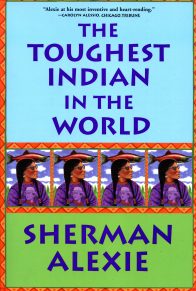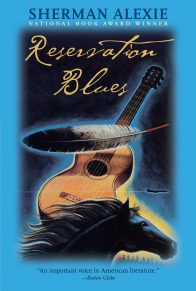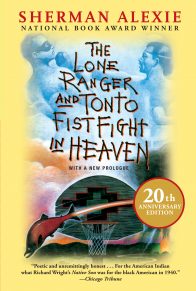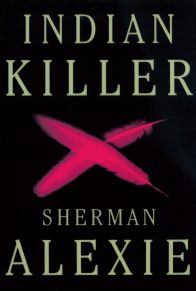1. The narrator begins the novel by stating, “my zits are me,” defining himself by his affliction. How else does he define himself? Speculating about rock stars with “stringy hair and greasy beards and bloodshot eyes,” Zits says, “As ugly as I am, I might have been the biggest rock star in the world” (p. 2). How, as he learns in juvenile detention (p. 26), is the acne a badge both of shame and poverty? How does his identity begin to change in the book? Does he seem liberated by inhabiting clean-faced people in his travels?
2. How is shame at the heart of dislocated Indians? What kinds of shame, besides his “ugliness,” does Zits suffer from? (see p. 5). How does the physical stigma serve as a metaphor for larger cultural deprivations? For the human condition? Can you think of other figures in literature for whom one oddity or deformity is emblematic of greater dilemmas? One thinks of Kafka’s Gregor in Metamorphosis who awakens one day as a giant, awkward insect. Or Captain Ahab with his cursed wooden leg in Moby-Dick. Others?
3. Zits has had twenty foster families by the time he is fifteen, and he started running away from them at age eight. What is the picture of foster parents he conveys in the book? Have you found that view corroborated in newspaper articles? “When it comes to foster parents, there are only two kinds: the good but messy people who are trying to help kids or the absolute welfare vultures that like to cash government checks every month. . . . But who cares, right? It’s not like I’m going to be here much longer. I’m never in any one place long enough to care” (p. 8). Do you see that Zits might have done things differently to make some of these foster homes work better?
4. “Whatever” is his protective shield and sometimes his weapon, to straight-arm people who might get too close to him or make demands. Does he make you think of Holden Caulfield in his teenage alienation? Anyone else?
5. “My mother loved me more than any of you will ever know” (p. 3). Is this the boy’s talisman? Is it the core of him that might ultimately provide a way out of his cycling nightmares, real and imagined? He also thinks his mother got cancer from grieving at her loss of his father. How did his own grief make him even more vulnerable to the repeated abuses of his childhood?
6. Zits is a boy whose childhood was taken away from him, leaving him bleakly lonely. “I don’t know any other Native Americans, except the homeless Indians who wander around downtown Seattle. . . . Of course, those wandering Indians are not the only Indians in the world, but they’re the only ones who pay attention to me” (p. 7). One thinks, too, of the drunken street Indian later in the book who shouts that he needs some respect. Are there ways to reclaim the lives of down-and-outers? Zits scoffs at the “overeducated, yoga-addicted” social worker who urges him to wear a necktie and shine his shoes to develop “a sense of citizenship” and learn to be a “fully realized human being” (pp. 6-7). Do you think the visible outward signs of uniforms in certain inner-city schools contribute to law, order, and self-respect? Should neckties and shoe-shine kits be part of shelters?
7. Among many sad, bitter, angry, vengeful characters in Zits’s life and travels are several who stand out for their humanity. Think about people who risk their lives for strangers, such as Little Saint and even Gus, the white liberals in Spokane, and Dave who as a good cop puts his life on the line every day even before he and Mary take the huge risk they do at the end. Are there others you can think of? Does Zits take stands that put him in this category?
8. As in The Glass Castle, by Jeanette Walls, we are startled to read about people rummaging through Dumpsters for food just to survive, even in this land of great plenty. Zits says, “I hate my country. There are so many rich people who don’t share. . . . They’re like spoiled little ten-year-old bullies on the playground. . . . if you try to get even one spin on the merry-go-round, the bullies beat the shit out of you” (p. 26). Do you see any of this in your community?
9. Justice picks his own name. “But I wish I’d been given my name by Indians. You guys used to give out names because people earned them” (p. 30). Zits is burdened not only with his spots but also with the rather horrible name. Yet Officer Dave can say it with growing affection. Does the last line of the book represent a name the boy hopes to earn? A state of grace perhaps?
10. What is the myth of the Ghost Dance? How does it create a dilemma for this boy of mixed blood? (see pp. 31-34). How does the myth relate to the bank scene where Zits takes his two pistols?
11. “I turn around to look at myself in the mirror. I expect to see me pretending to be Clint Eastwood. But instead I am looking at a face that is not my own” (p. 40). Fantasy? Nightmare? How do you read this dramatic down-the-rabbit hole book? It is a novel but also memoir, science fiction, travel literature, thriller, political polemic and cri-de-coeur. Talk about these fused elements of Alexie’s work.
12. Whether it’s Teddy Roosevelt or FBI agents, the outside perception of Indians is not positive. “None of them is worth much. Well, maybe some of the kids . . . are still okay. But they’re going to go bad, too. Just you watch. There’s something bad inside these Indians. They can’t help themselves” (p. 45). It’s a cliché that Indians will “go bad,” drink and fight on the streets . . . a sad departure from the idea of the noble savage (which has its own problems of misperception). How does Zits have to work through not only the myth but also the reality of this negative image?
13. What do we learn about 1975 Indian history in the story of Hank and Art, Hammer and Iron in Chapters 4, 5, and 6? What is the irony of Horse and Elk’s being regarded as heroes—back in the future?
14. Did you find a disconnect between the treacherous acts of Horse and Elk and their subsequent urgency about a traditional, decent burial for the sacrificed Junior? Were you reminded of Sophocles’s Antigone, whose family custom and her gods required dignified burial for her brother even though he had been killed as a traitor, and burial was forbidden by the king? Here we see Indian traitors, themselves responsible for the death who yet insist on taking responsibility for carrying out a ceremony. Do some of the Mafia stories resonate here?
15. When Art dismisses Hank’s concerns about the murder of Junior, he says (through tears he ignores), “We’re at war. We’re soldiers. And soldiers have to do some tough things. . . . And some of the things we have to do, they hurt us, you know? They hurt us inside. . . . In order to fight evil, sometimes we have to do evil things” (p. 56). Is there something chilling about this rhetoric from an FBI agent? Does this section make us think further about the consequences of war, to both captors and the captured? “Art and Justice fight on opposite sides of the war but they sound exactly like each other. How can you tell the difference between the good guys and the bad guys when they say the same things?” (p. 56). Discuss these rationalizations of Art. Any thoughts about the world today?
16. What are the ways Zits can feel powerful? Is that part of his quest? Think of Justice and his pair of guns. And Hank’s wife’s kisses: “God, I think I would kill for her kiss” (p. 58). Other ways?
17. Throughout his time travels and body jumping, Zits retains a sense of himself. What narrative purpose might this serve? Consider his response to violence: the torture of an Indian detainee on the 1975 reservation, for instance. How does Hank/Zits respond? Thinking back that he has killed a crowd of people in the bank, Zits realizes, “I am Hank Storm, too’ (p. 52). These killers of Indians are not other, he thinks. Hank Storm is his double. What does Alexie achieve by this sleight-of-hand? When Hank is ordered to reshoot Junior, the sense of connection is redoubled. ‘scared, I pull out my pistol and stand over Junior’s body. He looks so young. He’s a kid. Like me . . . Justice made all this killing make sense. But it doesn’t make sense, does it? I’m going crazy. I am crazy” (p. 53). How does Zits react to violence in his other time-travel roles?
18. How would you describe Alexie’s style? Edgy, energetic? Imaginative? Surreal? Does he make you think of Dalí or Magritte, with their sense of nonsense? He captures dreamlike leaps and disjunctures that still provide an odd logic. “I’m running through the dark. I run toward the sound of laughter. I run toward a bright light in the distance. I run super fast. And I wonder if I’m not running at all. What if I’m flying? What if I have become that bank guard’s bullet? What if I’m the bullet that blasted through my brain?” (p. 59). Does it sound like people’s description of near-death experiences? Zits says earlier, “I used to dream that I could run fast enough to burn up like a meteor and drop little pieces of me all over the world” (p. 16). Is that an image of what happens to him in his time-travel? What are other aspects of Alexie’s style in this book?
19. “I suddenly burst through the bright light, which is really the opening of a buffalo-skin tepee, and I run outside and stop. I am standing in the middle of a gigantic Indian camp. And I don’t mean some Disneyland, Nickelodeon, roller-coaster, stuffed-animal, cotton-candy Indian camp. Nope” (p. 59). Zits offers this disclaimer but how trustworthy is this narrator? After all, he said earlier that all he learned about Indians, champion-level Indian Trivial Pursuit knowledge, he learned from television. Is this the stuff of dreams? “These are how Indians are supposed to be” (p. 60). By whose lights? Even today Indians gather for giant powwows, as in Taos. These festivals are for tourism, certainly, but are they also a lifeline for retaining a culture and passing it on in tribes? What are your thoughts about assimilation as opposed to fighting for strong cultural traditions? Not only in Indians but also in other groups, including immigrants?
20. “These old-time Indians have dark skin. There aren’t any half-breed pale beige green-eyed Indians here. Nope, unlike me, these Indians are the real deal” (p. 60). Do you think intermarriage and watering down of bloodlines necessarily deprives people of authenticity? Zits has been robbed not only of a childhood but he never developed a sense of being Indian, except in a pejorative way. Do you think it is ludicrous that even though federal regulations state that Indian children should be placed in Indian foster homes, because his father never legitimized his paternity, Zits falls between those regulatory stools, too? And since his mother dies when he was six, he didn’t absorb Irishness, either. Have you read about other mixed blood people in this melting-pot country who had to work on discovering roots and authenticity and a sense of self? Think of Barak Obama and Search for My Father, in which he retraces his white upbringing and subsequent efforts to understand and participate in the black experience, including an odyssey to Kenya, the land of his birth father. If feeling of loss or confusion can be overcome, is it possible that intermarriage, whether race or religion, can produce people of broadened vision, with insights from both worlds? Talk about these ideas. (Later, Zits as Indian boy, sees Crazy Horse. . . . “I think the greatest warrior in Sioux history is a half-breed mystery. I think this legendary killer of white men is half-white, like me” (p. 68). Is this a wedge of understanding that there might be a valid place for a half-breed like himself?)
21. Quite apart from his original acne, Zits acquires other disabilities as the book progresses. In the Indian camp, what happens to the boy (another of Zits’s doubles) when his warrior father picks him up and hugs him? It is a moment he has longed for, back in the future, for fifteen years. How does he respond? He wants to scream “daddy,” but he can’t make a sound. Is this some archetypal dream terror? “I reach up, touch my throat, and feel a huge fleshy knot. It’s on my voice box. I don’t know if I was attacked by a person or by a disease, but my voice has been taken away” (p. 64). From what other impairments do his doubles suffer? Is this metaphor something unique to Zits, or to Indians, or to abused children, or are they manifestations of flaws or burdens we all bear?
22. This Indian boy of the nineteenth-century retains his knowledge of the tribes’ future. What can he do with this tragic vision? What other genocidal sweeps are you reminded of? “They’ll be packed into train cars and shipped off to reservations. And they’ll starve in winter camps near iced-over rivers” (p. 66). Do you think that here Alexie has expanded his myth of Native Americans into something more universal? “The children are going to be kidnapped and sent off to boarding schools. Their hair will be cut short and they will be beaten for speaking the tribal languages. They’ll be beaten for dancing and singing the old-time Indian songs” (p. 66). How do you respond to the complicated symbolism of Indians today getting rich from casinos . . . as they fleece mostly white people? Is this corruption of all concerned, or do the Indians deserve this chance at reclamation if not retribution?
23. In Flight do you sense a dreadful inevitability about the path of Native Americans? “All of them are going to start drinking booze. And their children will drink booze. . . . And one of those grandchildren will grow up to be my real father, the one who decided that drinking booze was more important than being my father. The one who abandoned my mother and me” (p. 67). What is suggested in the novel about a way out of the terrible cycle?
24. How is the spirit of myth, of universal truths, evoked by the events along the Little Bighorn? Crazy Horse, Sitting Bull, and of course, Custer. About Crazy Horse: “The magical one. Bullets couldn’t hit him. He could never be photographed. He was a holy ghost, the Sioux Jesus” (p. 68). How does Alexie create immediacy, putting us right on the scene? “Daddy! Daddy! This is the camp at Little Bighorn! Custer is coming! Custer is coming! He’s bringing the Seventh Cavalry and they’re coming to kill us! . . . But of course I cannot actually say anything because I don’t have a working voice box” (p. 68). Is he something between a mute Chicken Little and a Cassandra who wants to warn, but no one hears?
25. How is Custer portrayed in Chapter 9? Is this the conventional picture of him, or has he been romanticized as a defender of the white man? In Flight we learn “He wanted all the glory for himself” (p. 71). Despite the poetic justice of crushing defeat for the rash, vainglorious general, how does Alexie still force us to see the ambiguities and plain horrors of war? Think of the Indian victors’ celebrations and the grandmothers’ brutal vengeance; the anger and lust for revenge goes that deep. As Alexie debunks part of the Indian myth, does he also universalize the frequent viciousness of victory?
26. Rites of passage around the world are often violent, for both boys and girls. Discuss examples. What does the Indian boy’s warrior father expect of him . . . or offer him? “He’s just a kid, like me. I didn’t know they let kids join the cavalry” (p. 74). What is the connection between his scarred throat and his father’s implacable lust for revenge? How does the boy/Zits try to understand by recalling his rich white foster father (one of twenty, remember) who had the basement train collection? Why does the scene end before the boy actually cuts the soldier’s throat? Is there a gradual de-escalation of violence on Zits’s part as the book goes on?
27. Is it true that from the playing fields to battle grounds, fathers, coaches, drill sergeants, and politicians are often urging boys to be men, aggressive men? ‘my father yells at me in his language. He wants me to be a warrior. I am only a child. . . . I stare at the white soldier in front of me. . . . He’s a child and I’m a child, and I’m supposed to slash his throat. What do I do? I close my eyes’ (p. 78). Talk about these problems, not new to our time.
28. Is the time journey more nightmare than mythical quest? At least in the Odyssey, besides his monsters and vengeful gods, Odysseus has idyllic and seductive moments. Such moments are fleeting at best in this story. “I guess I must be a soldier now. I wonder which war I’m going to be fighting” (p. 80). How are the wars he endures or observers different from and similar to each other?
29. What are possible explanations for Zits’s travels back in time? Is it more than time travel? He actually inhabits these other beings. Is it guilt—from the bank adventure? Is it empathy that makes him assume these other identities?
30. What ties these stories together? How does the journey of Zits begin to cohere? War, vengeance, and power are clearly under scrutiny. As are treachery and infidelity. The brutality is atrocious as the white soldiers slaughter Indian warriors and a camp of women and children. Do we feel caught in an endless nightmare? One that reflects many parts of our world today? “But, no . . . Wait . . . Carrying an Indian child, a white soldier is running with Indians. . . . In the midst of all this madness and murder, one soldier has refused to participate. He has chosen the opposite of revenge. Somehow that one white boy, that small saint, has held on to a good and kind heart. A courageous and beautiful heart” (p. 93). How does this man’s action change the way Zits acts in his doubles’ bodies?
31. What is the reward of a kind heart in Small Saint? What war stories like this can you remember? Refusal to commit violence punished as treason. Are we hearing analogous stories about members of the U.S. military who go AWOL or refuse to serve?
32. Zits often ends his adventures or escapes by falling asleep. In Shakespeare this is often a chance to rest, dream, and awaken to rebirth. Does it work that way in Flight? Talk about the circumstances that precede his falling asleep in each of the tales. Does it seem abrupt and frustrating? Is it a thematic link in the novel? Each time, whether he knows it or not, is it a reprieve . . . for him and the reader?
33. What all is suggested by the title? When does Zits dream he is flying? Has he actually flown in planes? Do his characters fly? Is some of his flight away from loneliness and ennui a flight into himself?
34. What separates the story of Jimmy from earlier exploits? How does Zits describe Jimmy? Why does he move into talking about Jimmy in the third person? Why is Abbad a fleeting, in-and-out ghost of a character? How does Jimmy himself fit into the traitor theme? Who have other traitors been in the novel?
35. What did you make of the last time travel tale, about the drunk homeless Indian? How does he persuade a passerby to show him respect? Is it an ancient mariner story in a way, with someone compelled to tell a story to a stranger? What fundamental mystery of his life has Zits resolved by the end of Chapter 17?
36. Do you think that as a result of all this interpenetration of memories the narrator might have a chance of breaking the pattern of three or more generations of alcohol and physical abuse that has pervaded his family?
37. Does Chapter 19, his awakening back in the bank, make you think of the story set in the Civil War, “An Occurrence at Owl Creek Bridge”? (That is a story about a soldier awaiting hanging who dreams a rich escape in his last moments.) Here, Zits says “I have returned to my body. And my ugly face. And my anger. And my loneliness. And then I think, Maybe I never left my body at all. . . . Maybe I’ve been standing here for hours, minutes, seconds, trying to decide what I should do” (p. 158). What happens next? Is it a new empathy he has for this crowd of attractive, mostly white people? “Maybe we’re all lonely. Maybe some of them also hurtle through time and see war, war, war. Maybe we’re all in this together. I turn around and walk out of the bank” (p. 158).
38. How does the story of Auntie Z and her boyfriend determine Zits’s character up to the age of fifteen? He’s age six and the pattern starts. “Don’t tell anybody. Everybody knows you’re a liar. Nobody loves you anymore. . . . I learned how to stop crying. I learned how to hide inside myself. I learned how to be somebody else. I learned how to be cold and numb” (p. 160-61). Are there multiple battlefields for children?
39. What is significant about Zits’s approaching Officer Dave and his partner in the diner? “I want to tell him the entire story. I want to tell him that I fell through time and have only now returned” (p. 162). What is this power of narrative? Does narrative relieve or release the teller? Is it meant to instruct? To form a connection? What does Zits offer to Dave besides the pistols? “Officer Dave . . . I want you to know that I respect you” (p. 163). Is it possible that offering respect is as important as receiving it?
40. At the station house Zits’s story about where he got the two guns—from a kid named Justice—is viewed skeptically. “He thinks I invented Justice” (p. 165). Where does that leave you thinking about the whole book? Do you think Flight is a fable? Science fiction? Does it matter? What happens on the bank video to leave you wondering?
41. How does Dave’s terrible tale in Chapter 20 break down barriers between him and Zits? “Dave weeps. I weep with him” (p. 172).
42. “After months of counseling, social work, mental therapy, and absolute boredom, the medical professionals and social workers and cops decide that I am not going to kill anybody” (p. 173). After his travels into repeated violence . . . and his own revulsion . . . Zits has to see the irony. Then does he suddenly seem like a healthy, aggrandizing teenager? “I mean, jeez, I’m a fifteen-year-old foster kid with a history of fire setting, time traveling, body shifting, and mass-murder contemplation. I think I might be unlovable” (p. 173). Do you hear what we have learned to appreciate in Zits, that wry humor?
43. Do you find it credible that this angry, insolent street kid can clean up, sit down to breakfast, get his head tousled and say “Wow . . . permanent might be pretty cool?” Has Zits really been transformed to the point of trading “Whatever” for “Wow” with Mary? About Dave, he says, “He’s trying to save me. And he’s smiling about it. I guess that’s okay. Maybe I can save him, too” (p. 177). How is the notion of salvation pursued in Mary’s ministering to his acne? “A few months from now, you’ll be brand-new” (p. 180). How does this scene compare to the other moment in his time travels when he felt the warmth of family? What are the big differences?
44. What do you think are the chances for success for the renamed boy? “Call me Michael” (p. 181). Is he, after his travel education, ripe for redemption? He has worried over his need to connect with his Indian heritage, but at the end he settles in gratefully with a white family. What do you think this resolution means?














